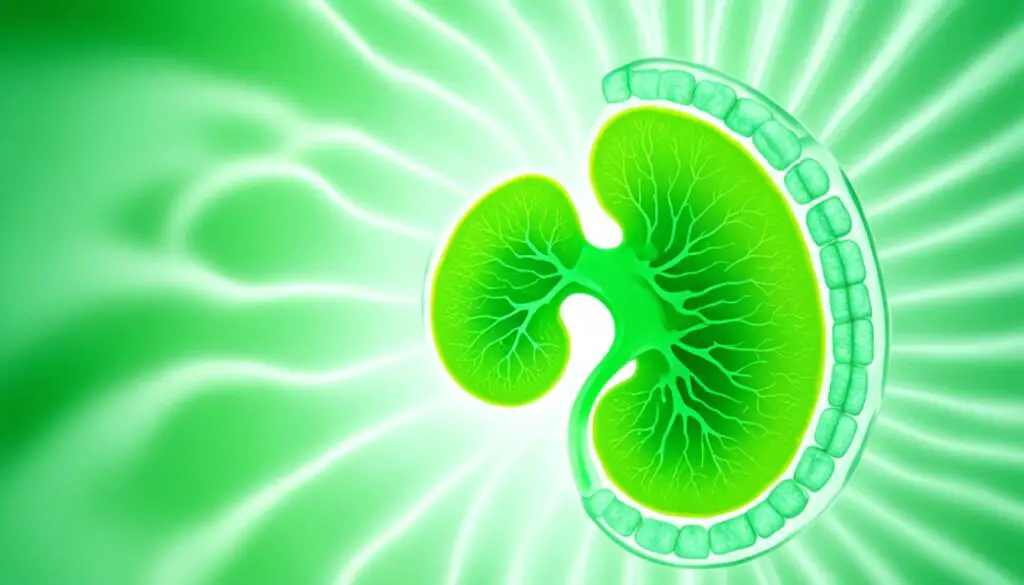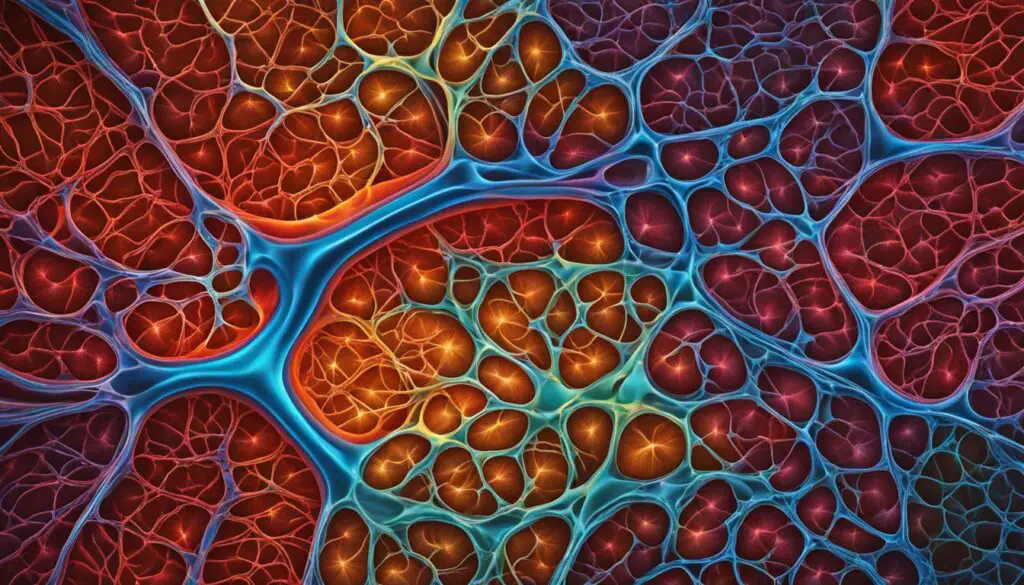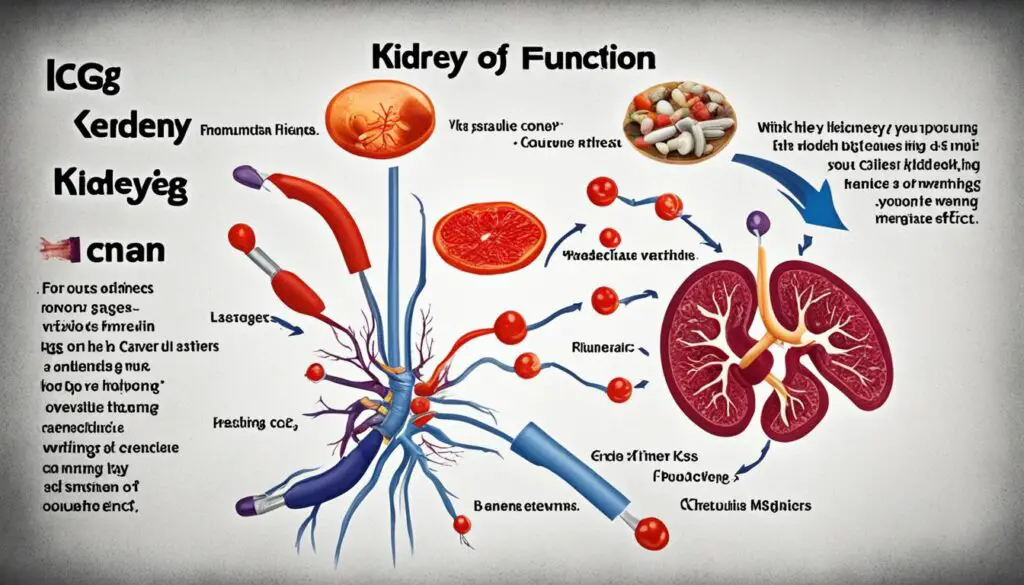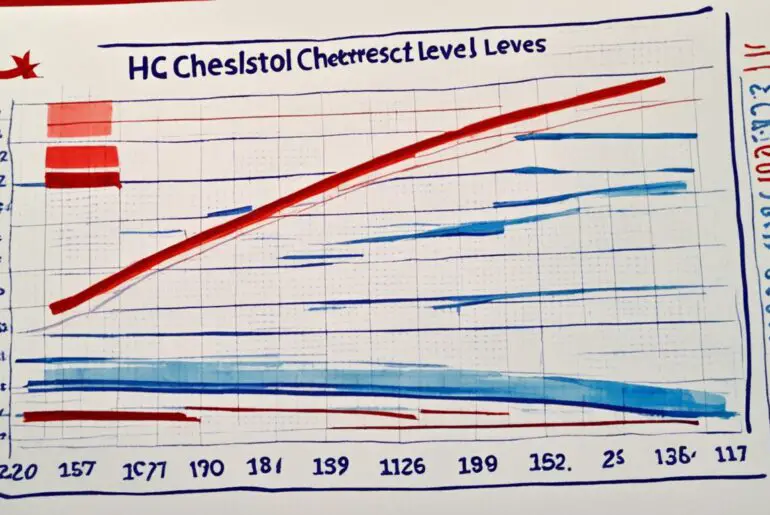Are you considering the HCG diet for weight loss and wondering about its impact on kidney function? Does this diet truly offer benefits for kidney health, or are there potential risks involved? It’s time to separate myth from reality and get the facts straight.
The HCG diet has gained popularity for its promise of rapid weight loss. It involves hormone injections or drops, combined with a strict, low-calorie diet. While many people claim to experience significant results and praise the diet, it’s essential to understand what truly influences these effects.
Contrary to popular belief, it’s the extreme calorie restriction that primarily drives the weight loss associated with the HCG diet, rather than any significant advantage from the hormone hCG. In fact, scientific studies have shown that hCG does not offer any additional benefits for weight loss.
But what about its impact on kidney function? Does the HCG diet have any implications for renal health? Let’s explore the relationship between the HCG diet and kidney function to separate fact from fiction.
Key Takeaways
- The extreme calorie restriction on the HCG diet primarily drives weight loss, not the hCG hormone itself.
- Scientific studies have shown that hCG does not provide any additional benefits for weight loss.
- The HCG diet poses potential health risks, including ovarian cysts, blood clots, and hormonal imbalances.
- The severe calorie restriction recommended in the HCG diet can lead to risks such as gallstone formation, irregular heartbeat, vitamin and mineral deficiencies, and electrolyte imbalances.
- There are safer and healthier ways to lose weight than the HCG diet, and it’s crucial to consult a healthcare provider for personalized recommendations.
The Role of Protein in Kidney Health
Protein plays a crucial role in maintaining kidney health. While there are concerns about the effects of protein on the kidneys, reports of protein causing kidney failure are often exaggerated. It is important to differentiate between excessive protein intake and a healthy protein intake that supports kidney function.
Effects of Protein on the Kidneys:
Consuming large amounts of protein does not directly lead to kidney failure. However, excessive protein intake can increase the workload on the kidneys. This is because the body requires extra water to flush out the byproducts of protein digestion, which may result in dehydration.
High-Protein Diets and Kidney Function:
While high-protein diets are popular for weight loss and muscle building, it is important to consider their impact on kidney health. It is recommended to consume an appropriate amount of protein based on body weight and to choose lean protein sources. These include kidney beans, tree nuts, and soybeans, which not only offer additional health benefits but also do not contain excessive saturated fats.
Recommended Protein Intake for Kidney Health
The recommended protein intake for kidney health varies depending on factors such as age, weight, and overall health. Generally, it is advisable to consume about 0.8 grams of protein per kilogram of body weight. However, individuals with kidney disease or compromised kidney function may need to follow specific guidelines provided by a healthcare professional.
Conclusion:
Protein is an essential nutrient for kidney health. While excessive protein intake can strain the kidneys, it is important to maintain a balanced protein intake based on individual needs. Choosing lean protein sources and staying adequately hydrated are key factors in supporting kidney function and overall well-being.
The role of protein in kidney health should not be overlooked. Consuming protein in appropriate amounts from lean sources can support kidney function while avoiding excessive strain on the kidneys.
The Safety and Efficacy of the HCG Diet

The HCG diet, promoted as a weight loss solution, has raised concerns regarding its safety and effectiveness. The Food and Drug Administration (FDA) has issued warnings against the use of over-the-counter HCG products for weight loss, stating that they are not approved and considered illegal. It is important to understand the risks associated with the HCG diet to make an informed decision about its suitability for your health and weight loss goals.
The FDA’s stance on the HCG diet
“The FDA advises consumers to avoid over-the-counter weight-loss products that contain HCG as they have not been proven effective and can have potential health risks.”
The FDA has not approved HCG for weight loss purposes, and the efficacy of the hormone in promoting weight loss remains unproven. Over-the-counter HCG products, including those labeled as “homeopathic,” are not regulated, and their safety cannot be guaranteed. It is crucial to prioritize your health and consult a healthcare provider before starting any weight loss program.
Potential risks of the HCG diet
The severe calorie restriction recommended in the HCG diet can lead to various risks and side effects that may impact your overall health and well-being. These risks include:
- Gallstone formation
- Irregular heartbeat
- Vitamin and mineral deficiencies
- Electrolyte imbalances
Additionally, researchers have suggested a potential increase in cancer risk due to the impact of HCG on androgen cells. While more research is needed to establish a definitive link, it further emphasizes the importance of cautious decision-making when considering the HCG diet.
Consulting a healthcare provider for safer alternatives
To prioritize your safety and find a weight loss approach that is both effective and sustainable, it is recommended to consult a healthcare provider. They can provide personalized guidance based on your health history, goals, and individual needs. Together, you can explore safer and evidence-based alternatives to the HCG diet that promote long-term weight management and overall well-being.
Remember, your health should always be the top priority, and professional guidance can help you make informed decisions about your weight loss journey.
The Impact of HCG Diet on Kidney Function
The HCG diet, with its severe calorie restriction, can have implications for kidney function. The diet’s low-calorie intake can lead to fluid imbalances, which can strain the kidneys. Additionally, the risk of dehydration is increased due to the body’s need to eliminate excess urea, a byproduct of protein digestion. Dehydration can have adverse effects on kidney health and overall well-being. It is crucial for individuals on the HCG diet to maintain proper hydration and be mindful of their fluid balance to support kidney function.
Proper fluid balance is essential for kidney health and overall bodily function. The kidneys play a vital role in filtering waste products and maintaining fluid balance in the body. When fluid levels are not properly regulated, it can put additional stress on the kidneys and compromise their function. This can lead to a variety of renal issues and potentially impact overall health.
During the HCG diet, the severe calorie restriction can directly affect fluid balance. The limited intake of calories and fluids can lead to dehydration, increasing the concentration of waste products and straining the kidneys. The kidneys need sufficient hydration to efficiently eliminate waste and maintain their optimal function.
In addition to fluid balance, the HCG diet’s impact on protein intake can also affect kidney function. The diet promotes low protein consumption, which can result in a reduced intake of essential amino acids needed for various bodily functions. While excessive protein intake is not recommended for kidney health, it is important to ensure an adequate supply of quality protein to support the kidneys’ needs.
Expert Insight
“The HCG diet’s severe calorie restriction can disrupt the delicate balance of fluid and electrolytes in the body. This can strain the kidneys, which are responsible for maintaining proper fluid balance. Dehydration and excessive fluid loss can have detrimental effects on kidney function, leading to potential health issues.”
– Dr. Emily Johnson, Nephrologist
To mitigate the impact of the HCG diet on kidney function, it is essential to prioritize proper hydration. Drinking an adequate amount of water throughout the day can help maintain fluid balance and support kidney health. Additionally, monitoring urine color can provide a simple indicator of hydration status. A pale yellow color indicates adequate hydration, while a darker color may suggest dehydration.
It is important to note that individuals with pre-existing kidney issues or compromised kidney function should consult with their healthcare provider before starting any weight loss program, including the HCG diet. Healthcare professionals can provide personalized guidance and help assess the potential risks and benefits based on individual health conditions.
In conclusion, while the HCG diet may offer initial weight loss benefits, its impact on kidney function should be carefully considered. Maintaining proper hydration and monitoring fluid balance is crucial for supporting kidney health during the HCG diet. Individuals with kidney concerns should prioritize their kidney health and consider alternative weight loss methods that align with their specific needs and goals.
Kidney Health Considerations for HCG Diet Users
When embarking on the HCG diet, it is essential to prioritize kidney health and take extra precautions to ensure its well-being. The drastic calorie restriction of the HCG diet can have implications for kidney function, making it crucial to maintain proper hydration at all times. Adequate fluid intake is vital to support kidney function and prevent dehydration, which can negatively impact overall health.
To maintain kidney health during the HCG diet, it is recommended to drink plenty of water throughout the day and pay attention to the body’s fluid needs. Staying hydrated supports the kidneys in filtering waste products and maintaining optimal function. Hydration can also help prevent the formation of kidney stones, a common concern during periods of low-calorie intake.
Regular monitoring of kidney function through blood tests is highly advisable when following the HCG diet. Consulting a healthcare professional for guidance and evaluation can help ensure that the diet is not causing any adverse effects on kidney health. It is important to proactively address any changes in kidney function and take appropriate action to minimize potential risks.
Additionally, incorporating kidney-friendly foods into the HCG diet can provide additional support for kidney health. Opt for foods that are low in sodium and high in nutrients, such as leafy greens, berries, and lean proteins. These choices can help maintain electrolyte balance and provide essential vitamins and minerals that support kidney function.
To summarize, individuals undertaking the HCG diet should prioritize kidney health. By staying well-hydrated, monitoring kidney function, and incorporating kidney-friendly foods, it is possible to support optimal kidney function and minimize potential risks associated with the diet.
Tips for Maintaining Kidney Health on the HCG Diet:
- Drink plenty of water throughout the day to stay hydrated and support kidney function.
- Monitor kidney function regularly through blood tests to evaluate any changes.
- Incorporate kidney-friendly foods into the HCG diet, such as leafy greens, berries, and lean proteins.
- Avoid excessive sodium intake and opt for low-sodium food choices.
- Consult a healthcare professional for personalized guidance on maintaining kidney health while on the HCG diet.
Alternative Weight Loss Methods for Kidney Patients

When it comes to weight loss for individuals with kidney disease or compromised kidney function, a cautious and guided approach is essential. The HCG diet may not be suitable for these individuals due to its potential risks and impact on kidney health. Instead, exploring safer weight loss options and adopting kidney-friendly strategies can be beneficial.
A balanced and nutritious diet tailored to individual needs is an excellent starting point. Working closely with a healthcare provider or registered dietitian can help develop a kidney-friendly meal plan that promotes weight loss while supporting kidney health. These professionals can consider the specific dietary restrictions or requirements for kidney patients, ensuring proper nutrition and safety throughout the weight loss journey.
Consultation with a healthcare professional or registered dietitian is highly recommended to create a kidney-friendly meal plan that supports weight loss and kidney health.
In addition to diet, incorporating regular physical activity can aid in weight management for kidney patients. Low-impact exercises approved by a healthcare professional can help improve overall fitness levels, promote weight loss, and support kidney function.
Here are some key weight loss options for kidney patients:
- Follow a balanced and nutritious kidney-friendly diet tailored to individual needs
- Consult with a healthcare professional or registered dietitian for personalized guidance
- Incorporate low-impact exercises approved by a healthcare professional
Kidney-Friendly Foods for Weight Loss
| Food Group | Examples |
|---|---|
| Fruits and Vegetables | Apples, berries, cucumber, spinach, bell peppers |
| Whole Grains | Brown rice, quinoa, oats |
| Lean Protein | Skinless chicken breast, fish, tofu |
| Healthy Fats | Avocado, nuts, olive oil |
| Low-Sodium Options | Low-sodium soups, unsalted nuts, fresh herbs |
| Fluids | Water, herbal tea, unsweetened beverages |
These kidney-friendly foods provide essential nutrients and can support weight loss efforts while prioritizing kidney health. Remember to always consult with a healthcare professional or registered dietitian to tailor the diet to individual needs.
By adopting safe and suitable weight loss methods, individuals with kidney disease can work towards their weight loss goals while protecting their kidney health. It is important to prioritize overall wellness and consult with healthcare professionals to ensure a well-rounded approach.
The Importance of Overall Kidney Health
Taking care of kidney health is vital for overall well-being. The kidneys play a crucial role in filtering waste products and balancing fluids in the body. Maintaining a healthy lifestyle that includes a balanced diet, regular exercise, and adequate hydration can support kidney function and reduce the risk of developing kidney diseases.
When it comes to maintaining kidney health, prevention is key. By adopting healthy habits and making conscious choices, you can protect your kidneys and ensure their proper functioning for years to come.
| Importance of Kidney Health | Ways to Maintain Kidney Health | Tips for Kidney Disease Prevention | Steps to Protect Kidney Function |
|---|---|---|---|
| Filters waste products | Eat a balanced diet | Manage blood pressure | Avoid excessive use of medications that can harm the kidneys |
| Regulates fluid balance | Engage in regular physical activity | Avoid excess alcohol consumption | Maintain a healthy weight |
| Supports electrolyte balance | Stay adequately hydrated | Quit smoking | Monitor blood sugar levels if diabetic |
| Helps control blood pressure | Limit sodium intake | Stay properly hydrated | Manage stress levels |
Regular check-ups with healthcare professionals, including kidney function tests, can help detect any issues early and prevent further complications. If you have existing kidney conditions or concerns, it is essential to work closely with your healthcare team to create an individualized plan for maintaining and improving kidney health.
The Role of Hormones in Kidney Function

Hormones play a significant role in kidney function. Imbalances in hormone levels can impact the kidneys’ ability to regulate fluid and electrolyte balance, leading to various kidney-related issues.
One example of how hormonal imbalances can affect kidney health is seen in conditions like polycystic kidney disease. This genetic disorder causes the formation of fluid-filled cysts in the kidneys and disrupts their normal functioning. Hormonal imbalances, specifically elevated levels of certain hormones, contribute to the development and progression of this condition.
Additionally, hormones can influence blood pressure regulation, which directly affects kidney function. Hormonal hypertension, characterized by elevated blood pressure due to hormonal imbalances, can strain the kidneys and potentially lead to kidney damage over time.
To maintain optimal kidney health, it is crucial to strive for hormonal balance. A healthy lifestyle, including regular exercise, stress management, and a balanced diet, plays a vital role in promoting hormonal equilibrium. Consulting healthcare professionals or endocrinologists is advisable for individuals experiencing hormone-related concerns, as they can provide appropriate diagnosis and recommend suitable treatments.
“Hormones are key regulators of kidney function, and maintaining hormonal balance is essential for optimal kidney health.”
Potential Risks and Side Effects of the HCG Diet

The HCG diet carries significant risks and can have various side effects that individuals need to be aware of before considering its use. It is crucial to understand the potential health complications associated with this diet plan in order to make an informed decision.
Risks of the HCG Diet
- Development of Ovarian Cysts: Women who use HCG may experience the growth of ovarian cysts, which can cause pain and discomfort.
- Blood Clots: The HCG diet has been associated with an increased risk of blood clots, which can be potentially life-threatening.
- Hormonal Imbalances: HCG can disrupt the delicate balance of hormones in the body, leading to various health issues.
- Unwanted Pregnancies: Women of childbearing age should be cautious as HCG can interfere with fertility and increase the risk of unintended pregnancies.
Side Effects of the HCG Diet
- Rapid Testosterone Production in Men: HCG can stimulate excessive testosterone production in men, potentially causing adverse effects such as breast enlargement.
- Health Complications: The severe calorie restriction and hormonal impact of the HCG diet can lead to serious complications such as blood clots and thromboembolism.
- Fertility Issues: Both men and women may experience fertility-related problems due to the impact of HCG on hormone levels and reproductive function.
Before starting the HCG diet, it is important to consult with a healthcare provider to fully understand the potential risks, side effects, and health complications associated with its use. They can provide personalized advice and guidance, taking into consideration individual health factors and goals.
| Risks of HCG Diet | Side Effects of HCG Diet |
|---|---|
| Development of Ovarian Cysts | Rapid Testosterone Production in Men |
| Blood Clots | Health Complications |
| Hormonal Imbalances | Fertility Issues |
| Unwanted Pregnancies |
Seeking Professional Guidance for Weight Loss and Kidney Health
When embarking on any weight loss journey, especially if you have kidney concerns, it is crucial to seek professional guidance. Consulting with a healthcare provider, such as a doctor or registered dietitian, can provide valuable insight and personalized recommendations based on individual health needs. These professionals can assess kidney function, address any underlying conditions, and create a safe and effective weight loss plan. They can also offer guidance on incorporating lifestyle changes to support kidney health and overall well-being.
Understanding the Limitations of the HCG Diet

While the HCG diet may promise rapid weight loss during its initial phase, it is important to recognize its limitations. The diet’s restrictive nature, with its extremely low-calorie intake, makes it challenging to sustain long-term results. Many individuals who have followed the HCG diet find themselves regaining the lost weight once they resume a regular eating pattern.
The unsustainability of the HCG diet is a significant concern for those seeking healthy weight management. This diet fails to promote long-term lifestyle changes necessary for maintaining weight loss and overall well-being. Instead, individuals should consider more balanced and sustainable weight loss methods that prioritize their overall health.
To convey the limitations of the HCG diet effectively, it is crucial to present concrete evidence and expert opinions. Including testimonials from former HCG diet followers who experienced weight regain can provide personal insights into the diet’s unsustainability. Furthermore, incorporating statistics or studies comparing the long-term success rates of the HCG diet with other weight loss approaches can solidify the argument.
“The HCG diet’s extreme calorie restriction makes it difficult to maintain weight loss in the long term. It is not a sustainable approach for healthy weight management and fails to promote sustainable lifestyle changes.”
Comparative Analysis: HCG Diet vs. Balanced Weight Loss Methods
To emphasize the unsustainability of the HCG diet, a comparative analysis can be beneficial. Here is a table highlighting the key differences between the HCG diet and more balanced weight loss methods:
| Criteria | HCG Diet | Balanced Weight Loss Methods |
|---|---|---|
| Caloric Restriction | Severe and unsustainable | Moderate and flexible |
| Long-term Success | Low, high risk of weight regain | Higher, sustainable weight loss |
| Lifestyle Changes | Minimal emphasis | Encouraged and promoted |
| Health Impact | Potential risks and nutrient deficiencies | Focus on overall well-being |
By comparing the two approaches side by side, it becomes evident that the HCG diet is an unsustainable and potentially risky weight loss method. This analysis further supports the conclusion that individuals should seek more balanced and sustainable weight loss methods for long-term success and overall health.
Conclusion
After careful consideration, it is evident that the HCG diet’s impact on kidney function is a cause for concern. The severe calorie restriction and potential risks associated with hCG hormone use overshadow any potential benefits. While rapid weight loss may occur, it is primarily due to the extreme calorie restriction rather than any advantage from the hormone itself. Therefore, the HCG diet is not recommended as a safe or effective long-term weight loss solution, especially for individuals with kidney issues.
To prioritize kidney health and overall well-being, it is essential to consult with healthcare professionals who can provide guidance and alternative weight loss methods. They can assess kidney function and create a personalized plan that supports both weight loss goals and kidney health. Safer alternatives that focus on balanced nutrition, regular exercise, and lifestyle changes should be considered to sustain long-term results.
Maintaining healthy kidneys is crucial for overall health, and it is important to prioritize kidney function through a conscious and informed approach to weight loss. By choosing safer and more sustainable options, individuals can achieve their desired weight while protecting their kidney health for the long term.
FAQ
Is the HCG diet safe and effective for kidney health?
The HCG diet has not been proven to be safe or effective for weight loss. The severe calorie restriction and potential risks associated with HCG hormone use make it a questionable choice, especially for individuals with kidney concerns.
Does protein intake affect kidney function?
Consuming large amounts of protein does not directly lead to kidney failure but can increase the workload on the kidneys. It is important to consume an appropriate amount of protein based on body weight and choose lean protein sources to support kidney health.
What are the potential risks of the HCG diet?
The HCG diet poses risks such as ovarian cysts, blood clots, hormonal imbalances, and potential effects on fertility. The severe calorie restriction recommended on the diet can also lead to gallstone formation, irregular heartbeat, vitamin and mineral deficiencies, and electrolyte imbalances.
How does the HCG diet impact kidney function?
The low-calorie intake associated with the HCG diet can lead to fluid imbalances and strain on the kidneys. Proper hydration and monitoring fluid balance are crucial for supporting kidney health while on the diet.
What considerations should be made for kidney health while on the HCG diet?
Individuals on the HCG diet should prioritize proper hydration and be mindful of their fluid balance to support kidney function. Regular monitoring of kidney health and incorporating kidney-friendly foods into the diet can also be beneficial.
Are there alternative weight loss methods for kidney patients?
Kidney patients should approach weight loss with caution and seek guidance from a healthcare professional. Safe weight loss options can be tailored to individual needs and may include a balanced diet and approved low-impact exercises.
How important is overall kidney health?
Maintaining overall kidney health is crucial for well-being. The kidneys play a critical role in filtering waste products and balancing fluids in the body. Healthy lifestyle choices and regular check-ups can support kidney health and prevent complications.
What is the role of hormones in kidney function?
Hormones play a significant role in kidney health. Imbalances in hormone levels can affect the kidneys’ ability to regulate fluid and electrolyte balance and contribute to various kidney-related issues.
What are the potential risks and side effects of the HCG diet?
The HCG diet can lead to risks such as ovarian cysts, blood clots, hormonal imbalances, and fertility issues. It is important to consider these potential complications and consult with a healthcare provider before starting the diet.
Should I seek professional guidance for weight loss and kidney health?
Yes, it is important to consult with a healthcare provider, such as a doctor or registered dietitian, for professional guidance on weight loss and kidney health. They can provide personalized recommendations based on individual health needs.
What are the limitations of the HCG diet?
While some people may experience rapid weight loss initially, the restrictive nature of the HCG diet makes it difficult to sustain long-term results. It is not a sustainable approach for healthy weight management and does not promote long-term lifestyle changes.
What are the final thoughts on the HCG diet’s impact on kidneys?
The HCG diet’s severe calorie restriction and potential risks associated with HCG hormone use raise concerns for kidney function. There are safer and healthier weight loss options available, and individuals with kidney concerns should prioritize their kidney health and consider alternative approaches.




